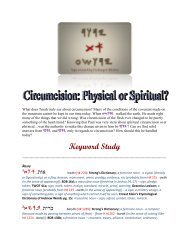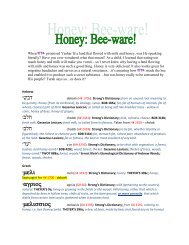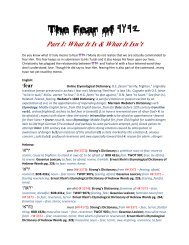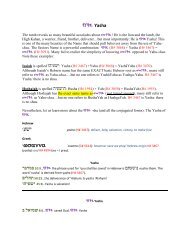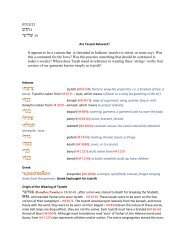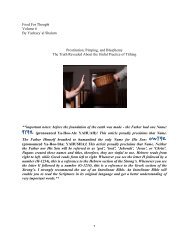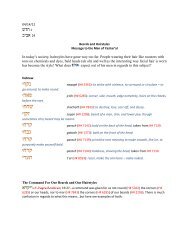What's In a Name? - Yahuah Is Life
What's In a Name? - Yahuah Is Life
What's In a Name? - Yahuah Is Life
Create successful ePaper yourself
Turn your PDF publications into a flip-book with our unique Google optimized e-Paper software.
this article; it will be of no use to you. However, if you now realize that The <strong>Name</strong> does matter, your<br />
repentance begins now!<br />
Let us take an extensive look through various witnesses concerning this subject. If you are using a King<br />
James translation, I recommend you retire it and find an <strong>In</strong>terlinear translation. Since the accounts that we<br />
have today were given to use in Hebrew/Aramaic and Greek, reading from those languages are crucial in<br />
regards to knowing what the original text stated. Only then can you begin to understand the complexity of<br />
the topic at hand. We will discover the importance of the <strong>Name</strong>, and why using false names and/or certain<br />
titles, may actually hinder our relationship with our Creator.<br />
The ONLY <strong>Name</strong> Ever Given יהוה<br />
“What is His <strong>Name</strong>, and what is His Son’s <strong>Name</strong>: If you know it!” This powerful passage found in<br />
Mashlý/Proverbs 30:4 is a beautiful invitation to search out the only <strong>Name</strong> ever given by the Most High:<br />
I am !יהוה (Shamuṭh/Exodus 6:6). <strong>In</strong> the beginning, humankind spoke one language<br />
(B-r῾åshýṭh/Genesis 11:1). Although there are many arguments surrounding the original language spoken<br />
by humankind, the Hebrew language is the language in which the Ṭurah (and His <strong>Name</strong>) was written in.<br />
For this reason, it is important to understand Hebrew (Âbrý) when it comes to understanding the <strong>Name</strong> of<br />
the Father.<br />
The translation of languages can be confusing. The full meaning of some words may not carry over well<br />
into the next language, and even when they do; subtle changes are often made by translators, which can<br />
distort or pollute our understanding. <strong>Name</strong>s are different because they are not translated: they are<br />
transliterated. When names are transliterated, the function of the alphabetical characters from the<br />
original word are being carried over (matched) to the same functional alphabetical characters of<br />
the next language; thus preserving the sound. If this is confusing, note the difference in definitions<br />
between translate and transliterate:<br />
translate: if something that someone has said or written is translated from one language into another, it<br />
is said or written again in the second language. If a name, a word, or an expression translates as<br />
something in a different language, that is what it means in that language.<br />
transliterate: "to write a word in the characters of another alphabet," 1861, apparently coined by<br />
German philologist Max Müller (1823-1900), from trans- "across" (see trans-) + Latin littera (also litera)<br />
"letter, character" (see letter).<br />
Here are a few examples of translation vs. transliteration:<br />
Example 1: barak (Hebrew) is translated as favor (English).<br />
Example 2: גדליהו (Hebrew) is transliterated as GadalYahu (English).<br />
Example 3: גדליהו (Hebrew) is transliterated as GadalYahu (English), and it means (translation) Yah<br />
has become great (English).



